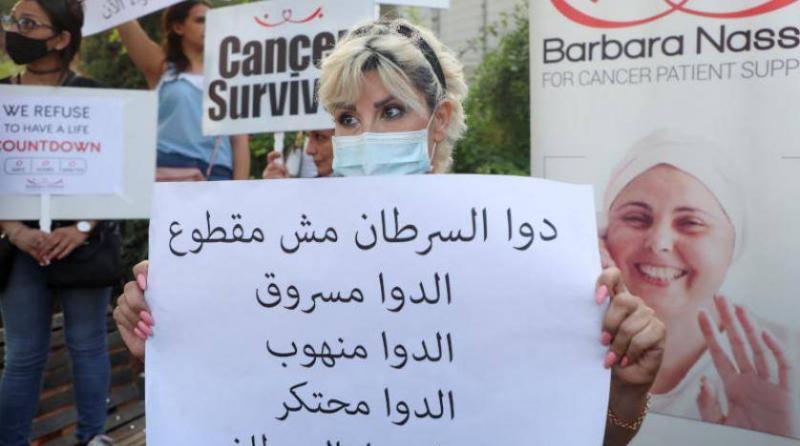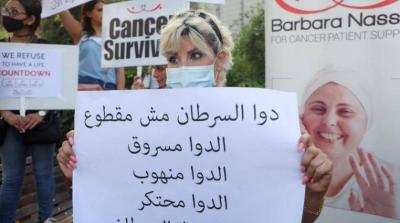Rita never imagined that providing the necessary medications for her cancer treatment would trouble her more than the disease that has been ravaging her body for three years, especially as medications for chronic and serious illnesses have not escaped the consequences of the economic collapse. Rita (53 years old), who preferred to use a pseudonym for the French press agency, said while holding back tears, "The cancer patient suffers the most in the world... the treatment is like a fire entering your body... and on top of all that, we have to search for the medicine."
Amid the ongoing economic crisis that Lebanon has been facing for nearly two years—classified by the World Bank as one of the worst in the world since 1850—no sector has remained untouched by the consequences of the collapse, including the healthcare sector and medications, most of which are imported from abroad. The scarcity of medications has led to a significant increase in their prices due to the collapse of the lira against the dollar, exacerbating the suffering of patients, the majority of whom can no longer afford their treatments or bear the cost of purchasing them.
The Ministry of Health used to provide medications to those without health insurance almost for free, benefiting many, including Rita, who was diagnosed with cervical cancer three years ago, which has recently spread to her lungs, causing her various health complications. However, she can no longer access those medications regularly.
Rita, a mother of three who lives in her brother's home in the Chouf area while he supports her, displays a collection of the medications she takes and explains, "My brother went to the Ministry of Health to look for medicine for me, and he couldn’t find it. I don’t know what I should do."
After detailing the stages of her treatment and the resulting infections in her blood and urine, along with her recent diabetes diagnosis, she clarifies, choking back tears, that she borrowed money recently to buy medication from the market. With deep despair, she asks, "If I can’t borrow this time, what do I do? Should I wait until my turn comes (to receive medicine from the Ministry of Health) and miss a stage of treatment while the cancer spreads further?"
She adds, "If the medication is not available, I die..." then continues in despair, "in either case, I am dead."
According to a report published by the Global Cancer Observatory under the World Health Organization in March 2021, Lebanon recorded 28,764 cancer cases over the past five years, including 11,600 cases in 2020. However, doctors clarify that the number of patients receiving treatment exceeds this figure since the treatment duration for some patients can extend for years.
Professor Ahmed Ibrahim, president of the Lebanese Society of Blood Doctors, explains that around 2,000 to 2,500 cases of leukemia and lymphatic diseases are recorded annually in Lebanon, and currently, "only a few of the medications used to treat them are available." He warns that "if these patients do not receive treatment regularly, some of them will die," noting that "some patients were on the verge of recovery and were nearing the end of their treatment. Suddenly, their medications were cut off."
Since the beginning of the year, Lebanese citizens have been desperately searching for their medications in pharmacies with empty shelves. Social media users post daily the names of needed drugs, ranging from ordinary pain relievers to medications for common and chronic diseases. Many have begun relying on friends and family abroad to provide their medications, at significantly higher prices compared to the supported local price, as 78 percent of Lebanese now live below the poverty line.
Importing companies used to submit import invoices to the Central Bank of Lebanon for payment as part of the support policy. However, with the scarcity of dollars and the flourishing of smuggling operations, monopoly, and price manipulation, prior approval is now required from the Ministry of Health for any drugs to be imported, with invoices payable later. This has led to the accumulation of companies' dues, causing them to gradually stop importing.
Amid the crisis, Health Minister Hamad Hassan of the caretaker government announced on Wednesday the intention of the World Bank and international institutions "to allocate $25 million to purchase chronic and incurable medications" for the Lebanese. Various initiatives and associations, including the Barbara Nassar Association, which supports cancer patients, have raised their voices, organizing a protest in Beirut on Thursday with dozens of patients demanding cancer medications.
Hani Nassar, the head of the association, says, "Imagine that in Lebanon, a cancer patient is asked, with all their worries, to go down to the street and demand medicine," questioning, "What is the patient's fault if the state is unable to control the crisis?" He warns that the danger lies in the fact that some patients "may die later" if they do not take today "the medications that protect their bodies from a wider spread of cancer."
After eight months of her marriage, Patricia Nasif (29 years old) learned in April that she had breast cancer, which turned her life upside down as she had hoped to become a mother. The young woman, who browses old photos of herself on her phone before having to wear a wig and gain weight due to treatment, recounts how she often "loses hope," questioning whether she will "live, and for how long." What worries her most right now is how to provide a medication she needs during her upcoming 12 treatment sessions, which is currently unavailable in the market.
With frustration, she says, "This is humiliation. All the effort we’ve made might go to waste, and the cancer might return to spread?" She continues, "As if they are telling us (die slowly)… I don’t know if they (the authorities) want us to die or live. They do not care about our lives."




